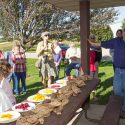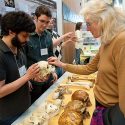UW-Madison symposium addresses science’s holiest grail: building life from scratch
While at the University of Wisconsin–Madison, biochemist Har Gobind Khorana helped crack the genetic code, completing a set of experiments that garnered him a Nobel Prize in 1968.
Shortly thereafter, he went on to synthesize the first artificial gene. Today, science has advanced to the point where entire genomes — the genetic blueprints for living organisms — can be assembled from scratch.
Later this month, the UW–Madison Department of Biochemistry will host a symposium in honor of Khorana, titled “Synthetic Genes to Synthetic Life: On the Exploration and Synthesis of Biological Systems,” that is designed to highlight the significance and legacy of his groundbreaking work. The speaker roster includes numerous rock star-caliber scientists, including Khorana, three other Nobel laureates, recipients of the Lasker Award (the “American Nobel”) and the National Medal of Science, and many others.
“In less than 50 years, we’ve come such a long way, from being able to synthesize little pieces of DNA to being able to synthesize life,” says biochemist Aseem Ansari, the symposium’s head organizer. “Building life is the holy grail. From simple chemicals, can scientists build something that lives, evolves?”
During the four-day symposium, which runs from Thursday, July 30-Sunday, Aug. 2, more than 50 researchers will talk about the key scientific advances — starting with Khorana’s work — that have made it possible to re-engineer cells and create life from scratch. The latter work will be the topic of a session titled “Origins and Designing Life-Synthetic Life,” set for 4:45-6:25 p.m. on Saturday, Aug. 1.
All sessions will take place at campus’s Ebling Symposium Center in the Microbial Sciences Building, 1550 Linden Drive. Although full registration costs $215, there will be a room set up where interested parties can watch the symposium for free via live video feed, and ask questions during question-and-answer exchanges.
Parking is available in Lot 20, at 1400 University Ave., and Lot 17, at 1525 Engineering Drive. Parking is free on weekends and after 4:30 p.m. on weekdays.



